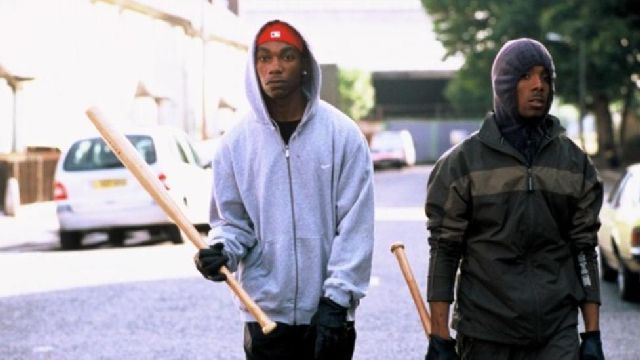Bullet Boy (2004) 
“You only get one shot at life.”

Director: Saul Dibb
Cast: Ashley Walters,Luke Fraser, Leon Black
Synopsis: In one of East London’s most volatile neighborhoods, pride, rivalry and revenge are the only codes on the street.
Saul Dibb’s examination of the gun culture amongst Britain’s ‘Ghetto youth’ is a well-meaning film that makes good use of authentic locations to tell a simple cautionary tale, but which is burdened with a predictable plot that fatally weakens the impact of its message.
Ashley Walters plays Ricky, son of a single mum and, in the absence of a constant father figure, object of admiration of his younger brother Curtis (Luke Fraser). As the film begins, Ricky is released from prison after serving time for stabbing a boy. Greeted at the prison gates by best friend Wisdom (Leon Black) and Curtis, Ricky returns to the mean streets of Hackney determined to go straight. Unfortunately, Wisdom accidentally clips the wing mirror of another youth’s car, and from this trivial incident, a spiralling series of reprisals and repercussions culminate in pointless deaths.
The real strength of this film is in its depiction of the posturing of the young males unable to ‘kick back’ and let things ride when they feel they have been ‘dissed’. The threat of a perceived lack of respect from their peers prevents them from doing so – even though they might want to — as the subsequent reputation for being soft would make life that much more difficult for them on the street. It’s a stupid, destructive trap they have built for themselves over successive generations, and it is with this one aspect of the film that Dibbs and co-writer Catherine Johnson succeed.
That alone isn’t going to carry any film very far however and, in addition to the mind-numbing predictability of the plot, the writers’ habit of making equally obvious associations regarding the causes behind the explosion of gun culture in Britain make it seem like we’re watching a film intended for young teenagers at times. For example we see young Curtis toying with his older brother’s gun after playing shoot-’em-up video games; we also see Wisdom ‘s nemesis raising the stakes in the pair’s own deadly game while Ricky enjoys an idyllic afternoon on the ice rink with his loving girlfriend Shea (Sharea-mounira Samuels), who represents his own real chance of survival. Comparisons are easily drawn, but such a lack of subtlety is a real drawback. Also, authority throughout the film is unfailingly depicted as white and vaguely adversarial — the police, the probation officer, the teacher — which transmits a dangerously subliminal (and quite probably unintended) message regarding the comparative power between the races and the consequent reasons for the position in which today’s black youth finds itself.
On the plus side, the film does well to create a world that appears authentic and avoids the diverse and equally inaccurate pictures of London we find in Eastenders and Guy Ritchie gangster flicks. Dibb’s documentary background is evident in his regular use of hand-held cameras to capture a real flavour of the streets and the council estate ambiance, while the cast are first rate, giving completely unaffected and convincing performances. Claire Perkins stands out as Beverly, Ricky and Curtis’s timeworn single mother embarking on a tenuous romance with a reformed hood who has found God. Young Luke Fraser also gives a remarkably subtle performance as Curtis who, given his final action in the film, is its only real hope for the future. It’s just sad, for both the jaded viewer and the film itself, that it is an action that doesn’t quite ring true…
httpv://www.youtube.com/watch?v=W9HmGBQ9LK8
